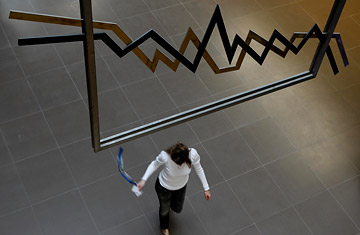
A woman walks beneath a sculpture inside the Athens Exchange
Greece's streets are covered in soggy confetti, remnants of this year's muted Orthodox carnival celebrations, which came to an end on Monday, the day when Greeks marked the beginning of Lent. For the country, a period of spartan repentance lies ahead — and not just because the seven-week period of Lenten fasting is starting. After years of overspending by both the government and ordinary people armed with credit cards — and now flush with credit-card debt — Greeks know the party is over. According to a poll released on Feb. 14, nearly two-thirds of people support the government's proposed austerity measures to cut the soaring deficit. Many even believe they don't go far enough.
Under pressure from the European Union, the Greek government has outlined a series of public-sector wage cuts and tax increases that are intended to help slash the deficit from the current 12.7% of GDP to the E.U. limit of 3% by 2012. While the impact of the new measures has yet to be felt, the delayed effects of the broader economic crisis are beginning to bite. The country slipped into recession last year and is now facing its worst economic contraction since 1987 — the last time Greece was forced to implement austerity measures following a previous round of government overspending. And across the country, the mood has started to sour: shops are closing and restaurants are half-empty. Many Greeks even say they'll cut back on going out to cafés — a pastime so central to the culture that it's akin to Americans saying they would give up television. More ominously, though it has yet to be directly linked to the financial crisis, a bomb exploded outside a JPMorgan Chase office in Athens on Tuesday night. No one was injured.
Costas Avdelas, 51, who lost his job at Olympic Airways when the government privatized the airline last year, fears the struggling economy means he won't be able to find new work anytime soon. "In Greece, there are no jobs, so there's no economic crisis," he jokes. Avdelas is getting a generous severance package from the state, but to survive, the family is also cutting back on luxuries. "We're trying to spend less. We try to eat at home instead of in restaurants," he says. Weekly trips to the movies are a thing of the past too. But like many older Greeks, Avdelas believes this period of austerity will soon pass. Tourists will return, drawn by the news of the financial crisis and the promise of cheap deals, he says, adding, "If the sun shines in Greece, we're not worried."
Greece's government is resisting pressure from its E.U. partners to make even deeper cuts. True to its socialist roots, it's trying to structure the measures in ways that will protect the poorest and most vulnerable members of society. To that end, the government says it will lower the threshold for the highest income tax bracket rather than increase the sales tax. But all Greeks are likely to feel the pinch in some way. The fact that many families usually rely on a variety of sources of income (including untaxed or black-market work), and because many own their own home, may help blunt the pain.
Young Greeks may be the most pessimistic about the future. Unemployment surged to 10.6% at the end of last year, according to the national statistics office, up from 7.8% a year earlier. Among young people specifically, the situation is even worse: 27.8% of 15-to-24-year-olds are now out of work. "We think, Why every day are we going to university and studying?" says Phaidon Kyriakou, a 19-year-old math and physics student who was flying kites with friends on Monday. "Nobody has any hope. There's no real opportunity here." He and his friends fear they'll have to leave Greece to find decent jobs.
Fofi Klimentidi, a 33-year-old teacher in Athens, is typical of many young Greeks who don't earn enough to support themselves despite being well-educated. She has an undergraduate degree from a Greek university and a master's degree in special education from the U.K. But the only job she can find is temporary, part-time work. In a good month, she makes $400. "My father helps support me," she said during a civil-servant protest against the austerity measures on Feb. 10. "We're already exploited by the state. We can't live on what they give us. How can they expect us to pay more?"
The frustration of young people occasionally explodes into violence in Greece. In December 2008, Athens and other major cities were racked by weeks of violent protests over the fatal police shooting of a 15-year-old boy as well as the perceived lack of opportunities in the country. Some young Greeks say that if the country's economic situation continues to deteriorate, people will again take to the streets. "Last December, we weren't just protesting about those who killed the boy. It was the beginning of protests about the economy and our situation," says 19-year-old student George Liberis. "In two years, in five years, I think there will be an explosion. We feel that the future may be very difficult, more difficult even than what they're telling us now."
There's little doubt that tough times are ahead. Taxes will go up, and be enforced more vigilantly. Wages will be cut and jobs lost as the economy contracts. Many Greeks will also have to work longer than they had planned. But Greeks aren't strangers to hardship. Older people, who remember the poverty and instability their country suffered through much of the past century, are philosophical about the current woes and still have faith that the E.U. will provide the necessary stability. "We have walked barefoot," said Stavros Mihos, a 72-year-old former teacher, gesturing at his feet. "This is nothing for us."
